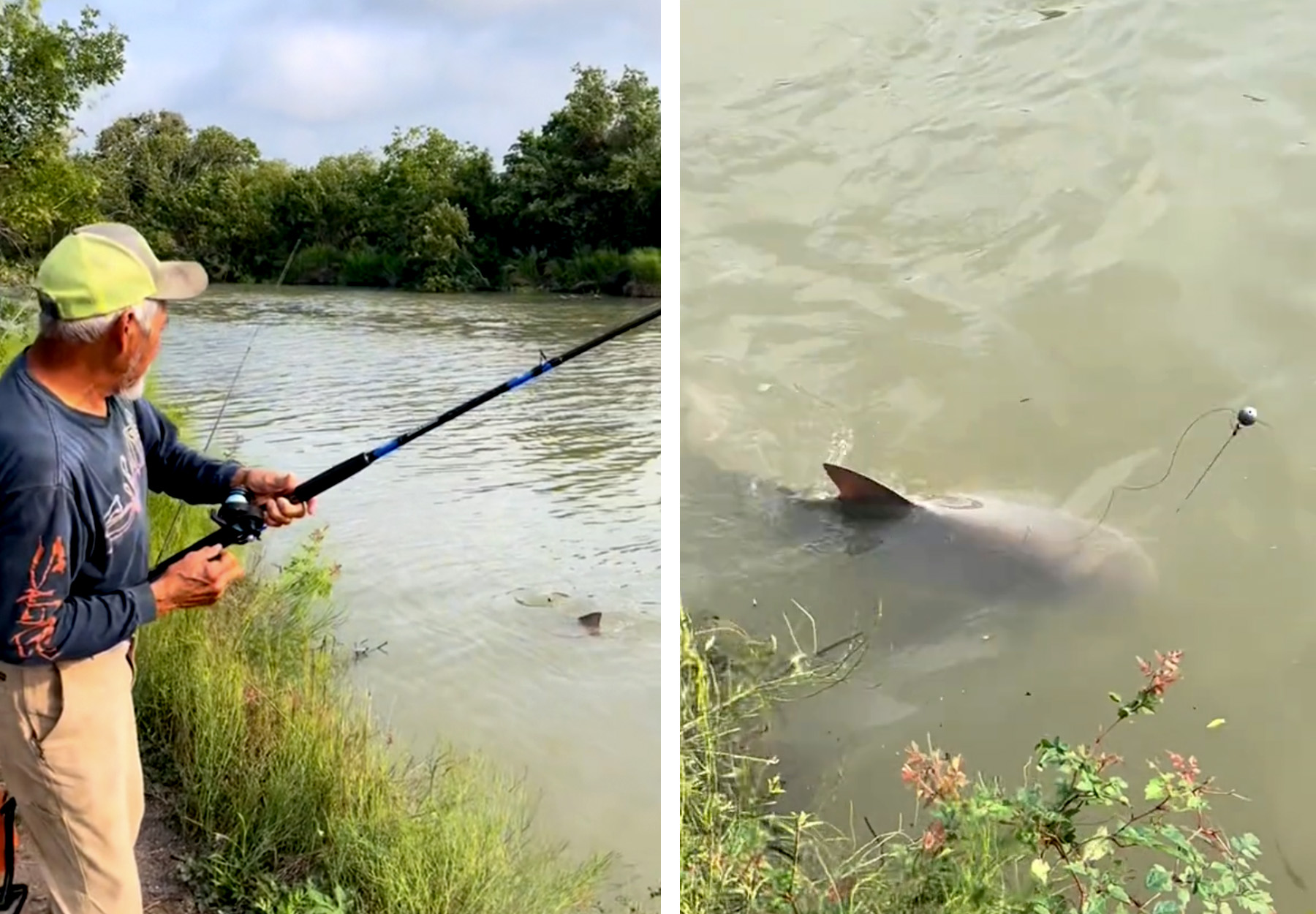A recent TikTok video that shows a Texas fisherman catching a bull shark in the Guadalupe River went viral this week. The video’s popularity also caused a minor panic on the internet, with many people expressing their dismay over a shark swimming in one of the state’s most heavily recreated rivers. It even inspired a satirical Facebook post by the city of New Braunfels, and a few local news outlets hopped onboard the anxiety train, asking if the video was fake or if it was possible for a shark to live in the river’s upper reaches near the heavily populated Central Texas region.
The short video clip that was uploaded by Jonathan Aguayo on Sunday shows an angler reeling in the bull shark from the riverbank. He’s using a heavy baitcasting rod and he lands the shark with a large gaff. Aguayo explains in the comment section that he’d brought the gaff in the hopes of catching an alligator gar. He also claims that he released the shark because it was under the legal harvest limit of 64 inches. (It’s unclear from the video if the shark actually survived, and while bull sharks are tough, we recommend carefully handling any fish that you plan on releasing. This means avoiding gaffing and stepping on the fish whenever possible.)
Here’s the thing, though. As cool as the video is, it’s not all that shocking for a couple of reasons.
First, bull sharks, unlike most shark species, can survive in brackish and freshwater environments for long periods of time. They’re known to travel upriver in systems that connect with the ocean.
“[Bull sharks] are able to move back and forth between saltwater and freshwater with ease. This behavior brings them into more contact with humans than most species of sharks,” says Oceana, an international ocean conservation organization. “Bull sharks do not just venture into freshwater for short periods. They travel far upriver in some places (including the Nicaragua River, the Zambezi River, and the Mississippi River).”
The Texas Parks and Wildlife Department echoes these facts, stating that bull sharks “have been found many miles upriver from the Gulf [of Mexico].”
Second, judging by the scenery in the video and the color of the water, the shark was almost certainly caught on the lower Guadalupe River near the Gulf and not in its upper reaches near the Hill Country. I would know, as I grew up in Central Texas and have fished most stretches of the river in a canoe.
The Guadalupe begins its journey in Kerr County as a rocky, spring-fed stream. The water is clear and cold in these upper reaches, and the scenery is stunning, with huge cypress trees growing along its banks. The river maintains these characteristics below Canyon Lake (where it’s impounded by a large dam) as it flows through Gruene and New Braunfels.
It’s this postcard stretch of the Guadalupe (pronounced Gua-da–loop by most Texans) that draws millions of inner tubers every summer, and it’s the area that most locals think of when they hear the name. But it’s not anywhere close to where Jonathan Aguayo was fishing when the bull shark was caught on video.
Aguayo did not immediately respond to a request for comment, but I’m willing to bet he was fishing on the lower Guadalupe closer to the Gulf. The river shown in the video is broader, deeper, and dirtier than the upper stretch. The plants and scenery are also indicative of the Gulf Coastal Plains, a large and flat region that covers the eastern part of the state.
Read Next: Salmon Shark Found Along River in Idaho Was Planted as a Prank, Officials Conclude
Aguayo appears to live in Victoria, Texas, which lies a short distance from where the Guadalupe spills into San Antonio Bay. This portion of the river is roughly 200 miles downstream from the stretch in Central Texas, and there are several large dams along the way that a bull shark wouldn’t be able to pass through.
Which means that tubers, swimmers, paddlers, and other Texas river users shouldn’t worry about bull sharks swimming in the spring-fed Guadalupe River this summer. Maybe just don’t get in the water near Victoria.

